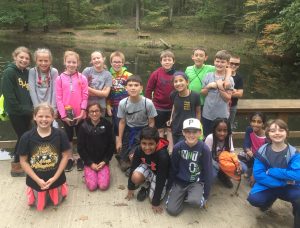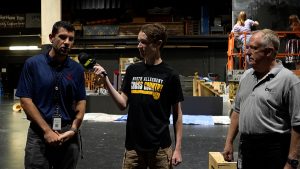Struggling for Authenticity
Our fear of standing out is more damaging than we realize
It can be hard to express yourself and your interests when there’s so much hostility around you. But that’s why it’s so important.
February 12, 2019
Recently, while scrolling through my list of recommended videos on YouTube, I stumbled upon a particularly bold woman with one of the most vibrant personalities and inspiring stories I have ever encountered. Her name is Emilia Fart.
On a surface level, it’s easy to disregard Ms. Fart’s content as simply cringe-worthy and over-the-top. She is criticized for being a try-hard attention-seeker (which, seeing as her regular attire is boas, robes, and orange eye makeup, and most of her content consists of her dying her hair in public places or eating McNuggets in her bathtub, is a fair assumption). However, a deeper look will reveal a complex, layered individual.
In multiple videos, she shares her struggle with self-acceptance and her experience with an eating disorder. She understands that she is perceived as strange and outlandish, but although she still experiences insecurities, she says she is much happier now than she was when she tried to assimilate into what others expected her to be. And although I’ve heard this message over and over a million times, this time is when it truly resonated with me.
Because of my anxiety, I’ve always been hesitant to open up about the things I enjoy. I’ve spent a lot of my energy worrying about if other people liked me, even my own friends. I’ve been afraid to share my thoughts and opinions, not so much for fear of being wrong, but for fear of being criticized. I refused to acknowledge my strengths because I thought that would inflate my ego. I’ve always known this was a problem, but I didn’t know just how poorly it was affecting me until this past summer.
For most of the summer, I worked at a summer camp that I’ve gone to every summer for ten years, which was immediately followed by a mission trip in Louisville, Kentucky. Both environments were filled with people who genuinely cared about me, who I could talk to about virtually anything I felt strongly about and they would just listen. They saw me for what I am, and they accepted all of it. Because of them, I found a potential in myself that I didn’t even know was there because I had buried so much of myself away.
Since then, I’ve made it a major goal to be open about what I like and what I believe. Although it’s so much harder to be comfortable with myself outside of those life-affirming bubbles, I’m inspired every day by people who live their lives authentically. And yet I still struggle not to judge others for some of the very things I was ashamed of.
As much as I have grown, this is how I know I’m still insecure. When we feel vulnerable, we go after others so we don’t have to deal with our own issues. We criticize, and we ridicule, and we deem certain people less valuable than ourselves based on the smallest, pettiest details, so we can feel superior even as we struggle to figure ourselves out. It solves nothing. We are still the same confused, scared people caught in a vicious cycle of judgment.
Nevertheless, it’s hard to resist, especially in high school. We constantly find ourselves surrounded by this toxic environment, and it makes us toxic, too. It can be hard to express yourself and your interests when there’s so much hostility around you. But that’s why it’s so important.
When we grow comfortable with who we are and what we like, we are less likely to point fingers and more likely to have empathy for people who are simply being themselves. We stop committing to an idea that there is a golden standard for everyone to imitate and appreciate the fact that people are very different. Some parts of ourselves may not be digestible for others, but that’s reality. We are so much more complex and flawed than we give each other credit for.
Being confident in yourself isn’t narcissistic — it’s quite different. It’s an understanding of your own identity and an appreciation of others’ identities. If more people were honest with themselves, we would have a much less toxic environment than we do now. If we could muster an effort to share some of ourselves with the world, we would be much more satisfied with ourselves and appreciative of each other. It sounds ridiculous, but it could be possible if only we were brave enough.













